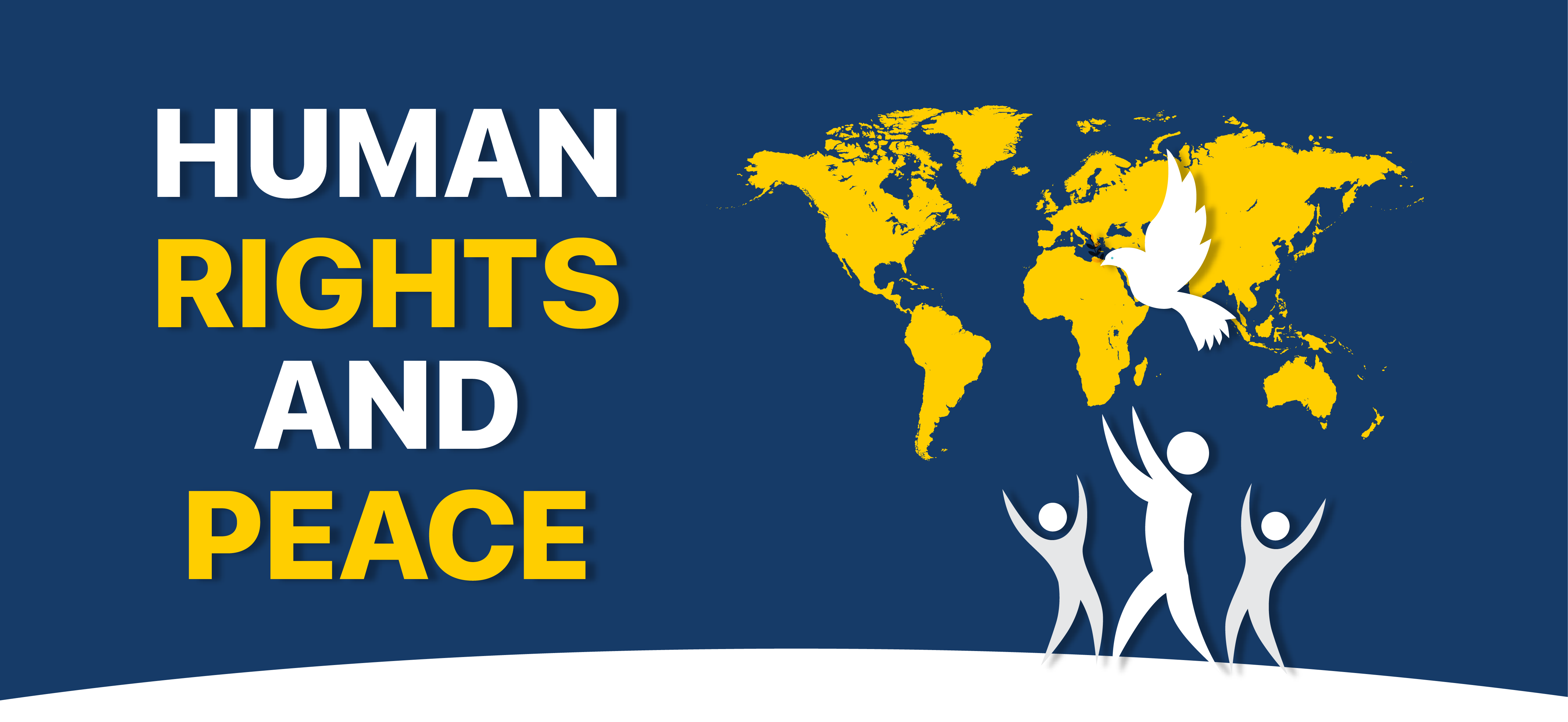HUMAN RIGHTS AND PEACE
Blogs Home
- 25 Sep 2023

The annual celebration of the International Day of Peace on September 21 serves as a potent reminder of humanity's shared desire for a future devoid of conflict and violence. This day was declared by the United Nations to call for an end to all conflicts worldwide and to inspire everyone worldwide to actively seek out channels for communication and understanding. The theme for this year is, Actions for Peace: Our Ambition for the #GlobalGoals.
Human Rights
Human rights are inalienable fundamental rights that everyone has, regardless of their nationality, race, religion, or any other distinguishing characteristic. They cover a broad range of civil, political, economic, social, and cultural rights that form the basis for respect, fairness, and equality. These values, which have their roots in the 1948 Universal Declaration of Human Rights (UDHR), provide a foundation for moral conduct and the treatment of people on a worldwide scale. Since then, they have been incorporated into several international treaties and conventions, highlighting the need to protect and advance human dignity everywhere in the world.
Freedom of Expression in the Digital Age
The idea of freedom of expression has grown more forceful and divisive in the digital age. The internet affords new opportunities for people to express ideas, but it also poses difficulties for content monitoring. It is a difficult task to strike a balance between the necessity of preserving freedom of expression and the imperatives of eradicating false information and ensuring public safety. The widespread adoption of social media and internet platforms has accelerated information diffusion, occasionally blurring the distinction between true interaction and detrimental misinformation. To enable people to successfully navigate this dynamic digital ecosystem, balancing these interests requires complex policy frameworks, technology advancements, and extensive media literacy programmes. Societies must advance in protecting freedom of expression while keeping the ethical obligations that come with it to traverse this changing digital terrain. One can only ensure that this basic human right thrives in the digital era by employing intelligent and flexible measures.
Rights of Indigenous People
The fight for indigenous rights is an international cause that has its roots in long-standing wrongs from the past. Indigenous populations suffer a wide range of difficulties, including economic marginalisation, land displacement, and cultural suppression. Through international legal mechanisms like the United Nations Declaration on the Rights of Indigenous Peoples (UNDRIP), efforts to protect their rights have gained ground. Implementation, however, is still a challenging issue because governments, businesses, and indigenous groups frequently disagree on resource extraction and development initiatives. In addition to a legal conflict, the struggle for these rights is also a cultural one.
One has to understand that indigenous rights are intricately linked to the fight for land rights and cultural survival. Indigenous identities are physically and spiritually rooted in the land, which is more than just a resource; it is an integral component of their cultural history. Many indigenous communities worry that governments, businesses, and newcomers may infringe on their traditional territory. These lands must be preserved not only for the benefit of the indigenous population but also for the health of the larger environment. Cultural preservation is equally important since it protects irreplaceable languages, customs, and knowledge systems.
LGBTQIA+ Rights and Discrimination
The path to equal rights for LGBTQIA+ people has made impressive strides, but it is still paved with both successes and obstacles. Legal acceptance has advanced over the past few decades, with many nations legalising same-sex unions and passing anti-discrimination legislation. The decriminalisation of homosexuality is a sign of changing societal attitudes that have occurred in many places of the world. Additionally, campaigns like the Free & Equal campaign of the UN have sparked a global dialogue about LGBTQIA+ rights. Significant discrepancies do, however, still exist despite these gains. LGBTQIA+ people continue to face stigma, violence, and discrimination, especially in places where cultural acceptance lags behind legal advances. The legal struggles for transgender rights are still fiercely fought, especially about matters like access to healthcare and gender-affirming practices. Additionally, discrimination is frequently made worse by the intersections of LGBTQIA+ identities with racial, religious, and socioeconomic identities.
True equality can only be achieved via persistent activism and inclusive legislation, which are still needed in the ongoing battle for comprehensive LGBTQIA+ rights. Also, it is the responsibility of society to address and eliminate prejudices, creating situations where everyone can live in freedom from discrimination regardless of their sexual orientation or gender identity.
Surveillance and Privacy Concerns
In the digital age, the conflict between governmental surveillance and the right to privacy has assumed critical importance. Governments contend that greater surveillance is necessary for national security because it makes it possible to identify and stop potential threats. Unprecedented capabilities for bulk data collecting, processing, and monitoring have been made possible by modern technology. The scope and scale of government monitoring activities have increased because of tools like facial recognition, biometric data collection, and other AI-driven surveillance systems. Concerns about possible abuses and unwanted intrusions into people's private lives have been raised by mass surveillance programmes, warrantless wiretapping, and metadata gathering. The emergence of the Internet of Things (IoT) and smart devices further complicates the situation because commonplace items could be used as surveillance channels.
However, these measures frequently invade privacy rights. Finding a balance between requirements for national security and personal privacy is a difficult task. To stop misuse and safeguard citizens' fundamental rights, strict regulation, openness, and strong legal frameworks are essential. Sensitive information can be protected from unauthorised access with the aid of effective encryption techniques and privacy-preserving technology. Additionally, for surveillance to be effective, public dialogue and awareness are also crucial. For this, building a culture of privacy awareness becomes important and it requires taking crucial steps including empowering people with a thorough understanding of their privacy rights and giving them ways to report violations.
Human Rights Violations in Conflict Zones
Human rights violations frequently worsen in crisis zones, putting citizens stuck in the conflict in dangerous situations. To lessen these abuses and help the afflicted populations, international organisations and actions are crucial. One well-known example is the Syrian conflict of 2011, where the UN has persistently worked to provide humanitarian relief, medical support, and instructional materials to individuals affected by the crisis through organisations like UNICEF and the World Food Programme. One striking example is the continuing conflict in Yemen which began in late 2014. There have been several human rights violations caused by the fighting, including insensitive bombs, a lack of food and water, and the displacement of millions of people. International groups like Oxfam and Médecins Sans Frontières i.e., Doctors Without Borders have made a significant contribution to the humanitarian aid and medical care given to Yemeni civilians. Nevertheless, despite their best efforts, the protracted conflict illustrates the difficulties of offering efficient relief in complicated, politically sensitive settings.
The global response was reluctantly delayed in situations like the Rwandan Genocide of 1994. The inability of the international community to stop the genocide or respond to it quickly served as a reminder of the urgency of taking faster, more coordinated action in the face of future crises involving human rights. The emergence of international doctrines like the Responsibility to Protect (R2P), which contends that states should protect their populations from mass atrocities and that the international community must intervene when states are unable or unwilling to do so, has been influenced by the lessons learned from such tragedies.
Peace
It is crucial to consider the lasting value of peace in our linked world, highlighting the necessity of harmony, cooperation, and compassion in the quest for a more secure and harmonious future for all.
Climate Change and Conflict
It is increasingly clear that conflict and climate change are related. Resources are becoming scarcer, especially in areas that are strongly dependent on agricultural and natural resources. Environmental changes including rising temperatures, unpredictable weather patterns, and sea level rise are major contributors. Competition and tensions over essential resources like water, arable land, and energy supplies may result from this scarcity. These environmental stressors might aggravate pre-existing concerns in places already dealing with political instability or ethnic tensions, possibly leading to wars. The connection between climate change and conflict emphasises how urgent it is to address environmental issues to maintain international peace. Nations may cooperate to reduce climate-related conflicts and create a more sustainable, secure future for everybody through proactive climate diplomacy.
Refugee Crises and Global Stability
Conflict, persecution, and environmental causes that result in widespread forced displacement have a significant impact on both regional and global stability. The resources and infrastructure of host countries are strained by displaced populations, which may cause social unrest and financial distress. Additionally, as refugee flows traverse borders, adjacent countries can experience security issues, potentially escalating already-existing regional conflicts. Approaches taken to solve this problem differ greatly. Recognising the potential advantages of variety and resilience, several nations employ inclusive policies that seek to integrate refugees into their society. Others concentrate on offering displaced communities support and humanitarian relief. International organisations, such as the UNHCR [United Nations High Commissioner for Refugees], aim to coordinate responses, promote long-lasting solutions, and ease burden-sharing among governments.
Diplomacy in the Modern World
When it comes to avoiding and resolving disputes in the modern world, diplomacy has undergone a tremendous transition. The importance of multilateralism, which emphasises collaboration and consensus-building among many governments, has grown. Organisations like the UN serve as prime examples of this. This strategy affirms the interconnectedness of international problems and strives for inclusive solutions. Joseph Nye's idea of "soft power" highlights the importance of cultural, ideological, and informational variables in international affairs. Governments increasingly use international education, public diplomacy, and cultural exchanges in addition to conventional political and economic methods to promote understanding and cooperation. Digital diplomacy has developed into a potent tool for communication and negotiation, made possible by the development of technology and social media.
Role of Women in Peacebuilding
Inclusion, sustainability, and resilience of societies depend on the participation of women in peacebuilding. In peace discussions, women bring distinctive viewpoints, experiences, and abilities that help create all-encompassing, long-lasting solutions. Through their involvement, issues like inequality and social injustice that are at the basis of conflict are addressed, resulting in more stable and peaceful outcomes. Women's efforts are essential to community rebuilding and equitable resource allocation during post-conflict reconstruction. Additionally, their participation frequently results in the passage of laws that give underprivileged groups—including women and children, who suffer disproportionately from conflict—priority protection and welfare.
Terrorism and Countering Violent Extremism
It is difficult to strike a balance between human rights and counterterrorism. Law enforcement, collaboration and intelligence sharing are essential, but oversight is essential to prevent privacy violations. To combat extremism, community involvement, addressing core causes, and providing social services are essential. Individuals may fight off radicalisation with the aid of education and critical thinking. Obstacles do exist. Privacy may be violated through surveillance, and discrimination may result from profiling. Legal standards and protections that are crystal clear are necessary to distinguish between dissent and extremism. Continuous examination, openness, and accountability in counterterrorism initiatives are necessary to achieve this balance.
Sources:
Books:
- Nye, Joseph S. "Soft Power: The Means to Success in World Politics." Public Affairs, 2004.
- Melissen, Jan. "The New Public Diplomacy: Soft Power in International Relations." Palgrave Macmillan, 2005.
https://www.un.org/en/about-us/universal-declaration-of-human-rights
https://www.hrc.org/resources/transgender
https://epic.org/issues/consumer-privacy/
https://www.unocha.org/syrian-arab-republic
https://www.un.org/en/genocideprevention/about-responsibility-to-protect.shtml
https://www.unhcr.org/us/about-unhcr/who-we-protect/refugees
https://www.unwomen.org/en/what-we-do/peace-and-security
https://www.un.org/womenwatch/osagi/wps/
https://www.un.org/en/observances/prevention-extremism-when-conducive-terrorism-day/messages
https://www.hrw.org/topic/terrorism-counterterrorism
https://www.unocha.org/syrian-arab-republic
https://www.cfr.org/global-conflict-tracker/conflict/war-yemen
https://www.britannica.com/event/Rwanda-genocide-of-1994
Annie Pruthi

Annie Pruthi is a Master’s graduate in Political Science from Jamia Millia Islamia. She is currently working as a Research Intern at PRIDE, Lok Sabha Secretariat. She is also the co-author of the book "Will You Stay?" and the recipient of the Coimbatore Literary Awards. (2020). Her research interests include Indo-Pacific studies.
Blogs Home



